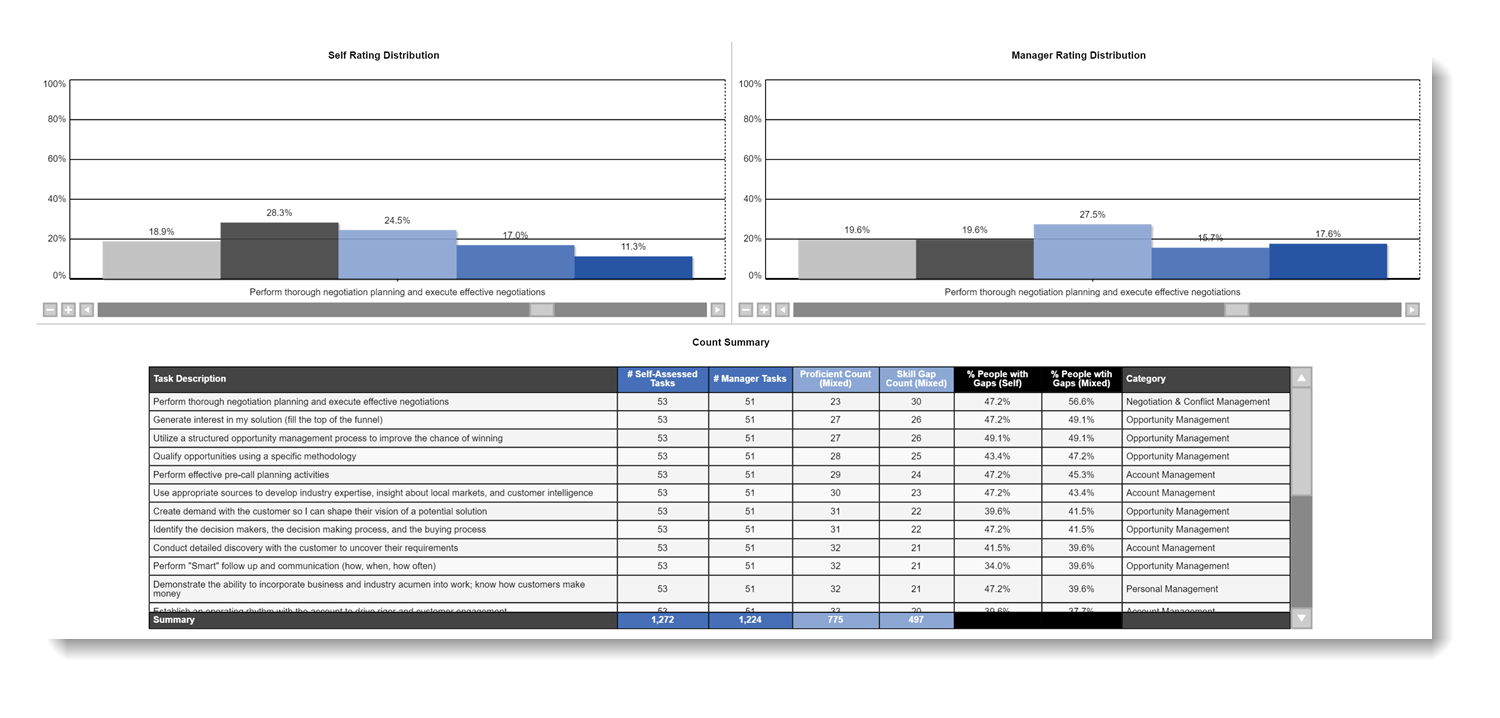We deliver competency assessment / skill assessment
We deliver competency assessment / skill assessment
One research study after another talks about the skills gap crisis. It’s a global issue costing organizations a LOT of money. Lost productivity. Inability to sustain competitive advantage. A downward spiral of opportunity for the workforce.
What happens when you don’t know what your employees can or can’t do? You can’t fix what you don’t know or if you don’t know how much it’s hurting you.
Are you ready to FINALLY close skill gaps in your organization?
Use a skills assessment to capture skills data from each individual and aggregate them in a way that tells you just how large of a skills gap problem you have. This requires you have role-based competency models that identify specifically what employees need to be able to do in their jobs, today and in the near future, to achieve their part of the corporate strategy.
Start with a self-assessment, so that there is buy-in to closing self-identified skill gaps. Where possible, include a manager or team leader assessment.

This process enables each person to answer the question, “Am I delivering on the skills and behaviors the organization needs?”
Kaiser Permanente Sales Manager

The value is understanding skill gaps and strengths at a granular level. It’s behavior-based, so you target the behaviors you want to change to drive the right proficiency improvements.
GE VP Sales Force Effectiveness
Organizations need to understand the impact of this widening gap on their business. The Fourth Industrial Revolution is changing everything. Leaders say that the skills that are most important for workers to succeed and get promoted are soft skills that will outlast the impacts of tech developments. These soft skills are growing in importance because automation, digitization, and AI can’t replace them. That’s why they are called Skills of the Future and they are the biggest and most critical skill gaps.
The future does not look bright with the status quo. If the ability to complete the necessary work in a way that enables the organization to retain its competitive advantage continues to diminish, how will it survive? As work is increasingly dependent on higher level skills such as innovation, critical, strategic, and design thinking, an understanding of both the size of the problem and the potential impact is imperative.
However, research shows that the more competent people become, the more engaged and satisfied they become and that leads to retention. And when individuals own closing their skill gaps, the organization’s skill gaps will close.
Can you think of any more effective, low cost way to close skill gaps than inspiring and empowering each person to do it themselves?


You must be able to create a skills gap analysis so you can tailor a story and support next steps for achieving each leader’s objectives. For example, “We want to be able to develop three new applications next year using XYZ technology. We have only 10 people proficient enough to do that. We need 30. We have 15 people who are close. Let’s upskill those 15 and hire 5. Here’s the plan for doing that.” That’s the value of skills gap statistics for the organization.
Your first assessment is your baseline and tells you where you are and where you need to go. Perform a competency assessment over time and you can measure the impact of the learning/what you bring to the organization. As strategy changes, adjust the role-based competency model’s skills. While the finish line may look different each time, you’ll always know where you are, and what you need to do to get there.
Despite the widespread implementation of learning management systems, learning engagement and skill gaps continue to grow. Why? Because the LMS is not designed to fix these problems. Search is hard. Content is limited. Only formal activities… not 70-20-10. Reports support activity consumption, not skills analytics business leaders need.
Once you know where skill gaps exist, the data provides Talent, Learning & Development with strategic direction on how to help the organization meet their goals. Aggregated Personalized Learning Plan data becomes real needs assessment data for demand planning.
– GE Capital Commercial Learning & Development Manager
Our competency assessment system takes just 2 weeks to implement. We provide everything you need to be successful, including communication toolkits and best practices tailored to all levels of the organization – employees, managers, and leaders.
